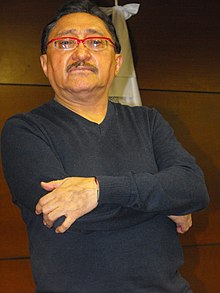Sergio González Rodríguez
| Sergio González Rodríguez | |
|---|---|

González Rodríguez at Tec de Monterrey, Mexico City
|
|
| Born |
26 January 1950 Mexico City |
| Died | 3 April 2017 (aged 67) Mexico City |
| Occupation | Journalist, critic, essayist and screenwriter |
| Language | Spanish |
| Nationality | Mexican |
| Alma mater | National Autonomous University of Mexico |
| Notable works | Huesos en el desierto, Campo de guerra |
| Notable awards | Fernando Benítez National Journalism Prize (1995) |
| Years active | 1993–2017 |
Sergio González Rodríguez (26 January 1950 – 3 April 2017) was a Mexican journalist and writer who was best known for his works on the femicides in Ciudad Juárez in the 1990s to 2000s, such as Huesos en el desierto (Bones in the desert) published in 2002. González Rodríguez also wrote novels, essays, screenplays for documentaries and was recognized with several awards in Mexico and Spain.
González Rodríguez was born in Mexico City in 1950. He studied modern literature at the National Autonomous University of Mexico from 1978 to 1982.
Aside from his writing career, he was a rock musician and lived in Mexico City.
Rodríguez died in hospital on 3 April 2017 from a heart attack.
González Rodríguez made his career as a critic, narrator, essayist, literary historian and scriptwriter.
After graduating, he worked at the Historical Studies Department of the Instituto Nacional de Antropología e Historia from 1985 to 1988. From 1990 to 1992, he was an assistant of the Exhibition Coordination of CONACULTA, working on a multimedia production called "Asamblea de ciudades, la Ciudad de México 1920–1950". His work in journalism includes editing at the Estudio de Salvador Novo A.C. and at the Biblioteca de México magazine from 1993 to 2000, as well as serving as editor and photographer at the Luna Córnea magazine from 1992 to 2002. When the Reforma newspaper was founded in 1993, he joined as editor and columnist for both the regular paper and its cultural supplement, called El Ángel. He has also worked for La Jornada.
González Rodríguez was best known for his investigative work about the femicides in Ciudad Juarez in the 1990s and 2000s. He began as an investigative reporter, making his first trip to the area in 1995 for Reforma. His series of articles served as the basis for the book, Huesos en el desierto (Bones in the desert), published in 2002, which mixes reporting, essay and reflective writing. This work was a finalist at the Lettre Ulysses International Prize of Literary Reporting in Germany and was translated into Italian and French. This work influenced other writing on the topic, including a direct collaboration with writer Roberto Bolaño, who was writing the novel 2666 in the early 2000s as well. González Rodríguez blamed the murders of the women on machismo and misogyny in Mexico. This examination of violence led to two other books that form a trilogy on modern violence, El hombre sin cabeza (Man without a head) and Campo de guerra, which examine drug-related violence and the role of international politics, respectively.
...
Wikipedia
